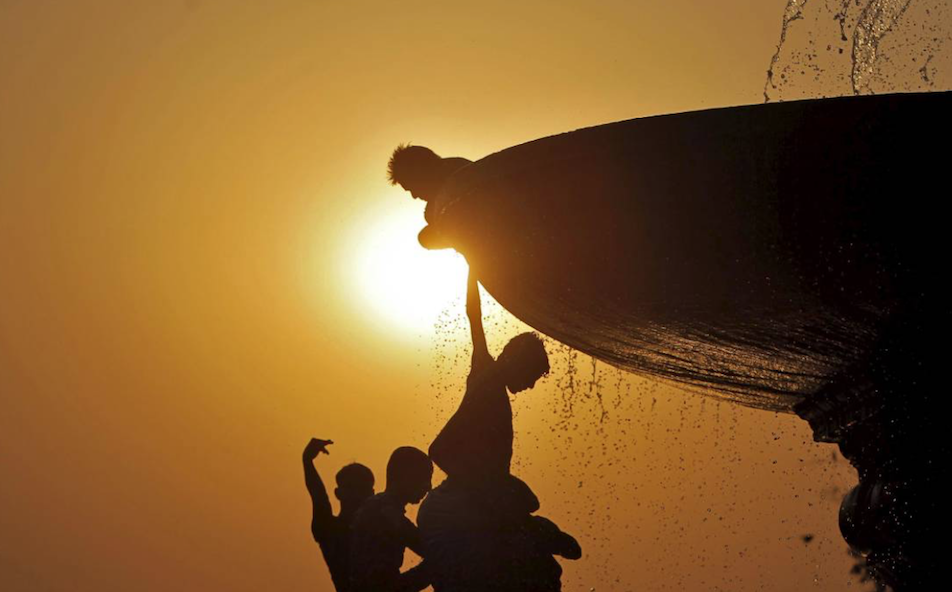By Laurie Goering
Thomson Reuters Foundation
Increasingly scorching summer heat in India is leading to a big jump in heatwave deaths – and much worse is likely on the way, researchers said on Wednesday.
A modest 0.5 degree Celsius rise in average temperatures in India over the last 50 years has led to a nearly 150 percent hike in heatwaves that kill at least 100 people, said researchers at the University of California in Irvine.
But with India now on a path to between 2.2 and 5.5 degrees C of temperature rise by the end of the century, the rate of heatwave deaths in India – and other Asian nations – could soar, scientists say.
“I was taken aback by how large the increase in the likelihood of these mass mortality events was with a modest increase in temperature,” said Steven J. Davis, an earth systems science professor at the university and one of the authors of a report, published in the journal Science Advances.
“Even under the lower global warming scenario, you still see temperature increases of 2, 3 or more degrees. We’re looking at a small temperature increase and still seeing a big increase in heatwave deaths. It seems pretty shocking,” he told the Thomson Reuters Foundation in a telephone interview.
With such temperature rises expected across much of the world by the end of the century, higher heat levels “may make low-latitude developing nations in the Asian subcontinent, the Middle East, Africa and South America practically uninhabitable during the summer months”, the report noted.
The study, based on temperature and heat death data from India between 1960 and 2009, looked at heatwaves defined as three or more consecutive days of very high temperatures.
It noted that in the years since 2009 heatwaves in India killed more than 1,300 people in 2010, 1,500 in 2013, and 2,500 in 2015 as summers grow hotter.
Recorded heatwave deaths in India are likely underestimates, the researchers said, because deaths, particularly in rural areas, may not be classified as being the result of heat.
Access to electricity – particularly for air conditioning – can help curb heat deaths, the study found, but about a quarter of Indians have no electric power, and nearly a quarter earn less than $1.25 a day, which can make electricity unaffordable.
Poor people particularly suffer
The poor are particularly hard-hit by heatwaves, researchers said, not only because many lack power but also because they often struggle to access clean drinking water and shelter from the heat, and may have health conditions aggravated by high temperatures and limited medical care.
India’s government is trying to expand access to electric power, in part to cope with rising heat, and aims to connect all homes by 2019 – a huge task in a nation of 1.3 billion people.
“Access to air conditioning and electricity is key to address heat-caused mortality and that requires significant investment,” said Amir AghaKouchak, one of the report’s authors. “India’s government is trying, they’re doing great. But the population is also growing. It’s not an easy challenge.”
Some Indian cities also have put in place heat action plans that provide emergency cooling centers, cancel leave for doctors and broadcast warnings when temperatures reach critical levels.
“India is quite proactive in climate-related education and outreach,” AghaKouchak said by telephone. “Awareness is the low-hanging fruit” in dealing with the problem, he added.
But bigger temperature rises expected in coming decades will make it harder to find effective coping strategies, Davis warned.
An ongoing heatwave in the Indian states of Odisha and Gujarat has killed nearly 20 people in recent days, with the summer only just getting underway, he noted.
A half degree of warming over the last 50 years already has boosted deadly heatwaves from one every eight years to one every three years on average, Davis said.
“Assuming that relationship holds for another half degree – or more – it could be much worse,” he said.
The findings, the researchers said, are “a wake-up call to governments and international organizations to devote resources and efforts to improving the resilience of areas most vulnerable to the impacts of climate change”.
As the United States prepares to withdraw from the Paris Climate Agreement, “we shouldn’t be turning our backs on the world that is suffering these effects,” Davis said.
+++++
Thomson Reuters Foundation produces journalism on climate change, humanitarian issues, resilience, women’s rights, trafficking and property rights. The foundation is the charitable arm of Thomson Reuters, which includes the Reuters news agency.

